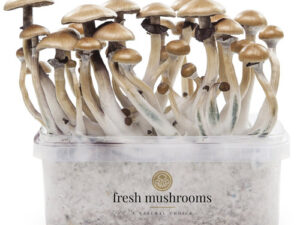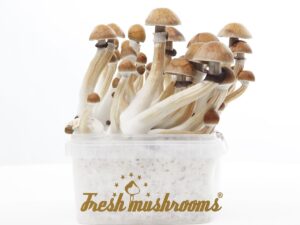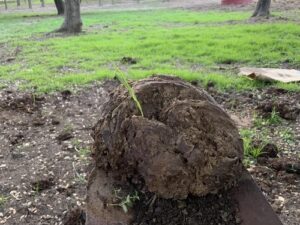Description
Buy Lion’s Mane Liquid Culture Syringe Online USA
-
Description
Lion’s Mane Mushroom (hericium erinaceus)
The health benefits of Lions Mane Mushroom are no joke.
Really, there aren’t too many incredible health claims from natural products that actually stand up to scientific scrutiny.
Everyday there is a new superfood or uber-supplement that is supposed to work miracles, and although a lot of these things are no doubt good for your health, they aren’t usually as miraculous as advertised.
That’s why it is so surprising to see that some of the claims around the health benefits of the Lions Mane mushroom, although quite incredible, are proving to be true.
It might not be surprising to everybody, though.
This mushroom has long been thought to be used to improve mental capacity, mental clarity and focus, improve nerve function and to actually encourage nerve regeneration.
Lion’s Mane has commonly been used as a nootropic, or “smart drug”, ingested by high performance individuals trying to get a mental edge.
It has also been used by people suffering from age related memory loss and reduced mental capacity with anecdotal reports claiming the mushroom can effect a substantial improvement.
So what’s the deal with Lion’s Mane mushroom?
Can it live up to the hype?
This article intends to investigate whether or not the reported effects of Lions Mane Mushroom are a real phenomenon, and if so, what the best way is to get some extra brain power in your life.
What is a Lions Mane Mushroom?
First of all, let me introduce the mushroom.
Lions Mane mushroom (scientific name Hericium eranacious) is a unique looking “toothed” fungus that naturally grows on dead or dying trees in temperate forests throughout the world.
It is commonly found in North America, although it might be in your guidebook under a different name, such as the Bearded Tooth or the Japanese Yamabushitake.
If you are lucky enough to find it in the grocery store, it might also be called a Pom-Pom.
Lion’s doesn’t resemble your typical stem and cap mushroom.
Instead, the fruiting body looks more like a snowball- with long tooth like formations drooping down from the main body. These “teeth” act as the gills of the mushroom, and is what the mushroom uses to distribute its spores.
Lions Mane mushrooms are a common and popular choice for small scale mushroom growers, and they are actively hunted by forest-trekking mushroom pickers.
Yet, they are rarely, if at all, seen in grocery stores.
And it isn’t because they aren’t tasty- in fact, the mushroom is a culinary delight adapting wonderfully to a multitude of dishes. Instead, the reason that they aren’t seen in the produce section is likely due to a relatively short shelf life, and the fact that the fruit can easily bruise and become unsellable if handled too roughly.
When the intended use of the mushroom is strictly for the health benefits, the mushroom is typically consumed as a supplement in the form of a powder or pill, sometimes also blended with other mushrooms or herbs.
Dosage, frequency, and duration of supplementation can vary widely.
Health Benefits of Lions Mane
If you wanted to try and use Lions Mane Mushrooms to improve your overall health, you definitely wouldn’t be the first.
Medicinal mushrooms have been used for hundreds of years- and have a long history of use in traditional Chinese medicine.
The not-so-short list of the reported potential health benefits of Lion’s Mane mushrooms include the following:
1. Potentially Anti-Cancer
Lion’s mane has shown potential in it’s ability to fight back against various types of cancer.
Although the studies done have been on mice and cell culture in-vitro, Lion’s Mane is showing promise and deserved of further stufy.
2. May Help Reduce Cholesterol
Lion’s Mane has been researched for it’s potential to improve the levels of LDL and HDL cholesterol in the blood.
Lion’s Mane may also be helpful for preventing the risk of stroke.
3. Produces Calming Effect
Studies have shown that Lion’s Mane may be useful in reducing the symptoms of depression and anxiety by producing a calming effect over time.
4. Neuroprotection
Extracts of Lion’s Mane mushroom have been researched for their ability to protect and actually repair brain cells.
5. Mental Clarity and Focus
People supplementing with Lion’s Mane report improved memory, cognition, mental clarity and focus. This is probably the most well known potential benefit of Lion’s mane.
The most interesting and promising items on this list are the potential to improve brain function and clarity- which is a pretty bold claim for a humble mushroom.
Research is showing that the secret weapon for the Lions Mane seems to be its ability to induce the production of Nerve Growth Factor (NGF).
NGF, which is naturally produced in the human brain, is involved in the maintenance, protection, and production of neurons- which are essentially the circuits in the computer that is your brain.
You can see why this stuff might be good for your brain, and why a lack of it would be bad.
There are not many things in the natural world that have ever been found to have the ability to stimulate production of NGF, which is what makes Lion’s Mane mushroom so interesting.
By increasing NGF, the brain’s neurons are better protected, reducing naturally occurring cognitive decline due to aging.
Even more impressively, Lions Mane might actually be able to stimulate nerve generation, in which fresh neurons are produced and existing neural networks are made stronger.
This could improve cognitive ability, even for people with healthy and functioning brains.
Here is a quick video of mushroom legend Paul Stamets talking about the potential benfits of this mushroom:
Evidence and Medical Research on Lion’s Mane
There have been plenty of scientific studies done which conclude that Lions Mane mushrooms may indeed stand up to its health claims. One recent example is a 2009 double-blind placebo controlled study in Japan.
They took two groups of 15 people, giving a placebo to one group, and 250mg of Lions Mane to the other.
The study found that “At weeks 8, 12 and 16 of the trial, the Yamabushitake group [lion’s mane] showed significantly increased scores on the cognitive function scale compared with the placebo group.”
It concluded “The results obtained in this study suggest that Yamabushitake is effective in improving mild cognitive impairment.”
Another more recent study conducted in 2011 tried to test the hypothesis that Lions Mane mushroom could quicken recovery from brain injuries.
The study was done by purposefully damaging the brains of rats followed by administering an aqueous extract of Lions Mane mushroom during the recovery.
The point of the study was to “investigate the possible use of this mushroom in the treatment of injured nerve.”
They found that neurons regenerated better in the Lions Mane group than in the control group and concluded that “Patients who receive H. erinaceus may experience a more expeditious improvement in the quality of life and a more complete functional recovery after injury.” (8)
Scientific papers are usually pretty dry, but this is exciting stuff. It gives hope to potential improvements for people suffering from brain injuries and other cognitive disorders in general.
Anecdotal Reports
Aside from rigorous scientific studies, there are plenty of anecdotal reports that supplementing with Lion’s Mane can have a marked effect on brain power.
It is widely considered a “nootropic”, also known as “smart-drug”, taken to improve concentration, focus, memory and creativity.
People who use this mushroom as a supplement don’t usually feel the effects right away.
Lion’s Mane is a natural product, and the benefits seem to come on subtly over time. This makes sense when considering the mode of action is for Lions Mane to simulate Nerve Growth Factor.
It takes time for the production and protection of nerve cells in the brain to have beneficial effects.
On the other hand, Tim Ferris, famous entrepreneur and author of the Four Hour Workweek, The Four Hour Chef and the Four Hour Body often talks about taking Lions Mane Mushroom in the form of an instant coffee.
The coffee’s main selling point is that contains Lions Mane extract, although it also contains other medicinal mushrooms.
Tim claims that the coffee supercharges his focus, and gets his brain firing on all cylinders. This likely isn’t caused by much more than the caffeine and a healthy dose of the placebo effect, as Lion’s Mane itself shouldn’t be able to act that quickly.
That being said, it is totally plausible that a combination of coffee and different mushrooms might have fast acting nootropic effects.
Lion’s Mane Mushroom Extracts
So how are Lions Mane mushrooms cultivated for extracts and supplements?
There are a couple different ways that Lions Mane mushrooms are cultivated for the purposes of supplementation. One method involves actually growing and harvesting the complete mushroom fruit body, while the other method involves only growing the mycelium on grain.
The difference between these two methods is huge, and has a enormous impact on the quality of the final product.
Mycelium On Grain
“Mycelium on grain” is a method of growing Lions Mane mushrooms for the purposes of supplementation without ever producing an actual mushroom.
You can think of mycelium as the “roots” of the mushroom.
This is grown out on grain, similar to the process of making grain spawn. This “myceliated grain” is then pulverized and sold as a Lions Mane supplement. This is the common method in which “mushrooms” for the purpose of supplementation are grown in the United States, where it is simply not cost effective to do otherwise.
The problem is that the beneficial compounds are contained in the mushroom itself, and are not found in significant quantity when produced from mycelium on grain. The end result is a supplement that is mostly grain starch, and cannot be compared to pure Lions Mane mushroom.
Some research shows that beta-glucans are indeed found in “mycelium-on-grain” products, but there is substantial evidence to prove this research is flawed. The presence of beta-glucans is actually just a false positive for alpha-glucans- a compound commonly found in grain starch.
This is a bit of a rabbit hole to dive into- and may be out of the scope of this article- but if you want a good explanation on the reasons why mycelium on grain products are inadequate for supplementation check out this video.
Whole Fruitbody
This is what comes to mind for most people when they think of growing mushrooms. It involves actually growing the mushroom to completion and harvesting the entire fruitbody.
This fruitbody is then used to produce an extract.
If done this way, the end supplement will contain all the beneficial compounds of the mushroom, which is the reason why people seek out a Lions Mane supplement in the first place.
That being said, it is much more expensive to produce mushroom supplements in this way.
Luckily, you can still find supplements produced from whole mushrooms that are certified organic and of the highest quality. The end result is a product that contains high levels of beta glucans and low levels of starch- far superior to supplements produced from mycelium-on-grain.
The bottom line when looking to buy Lions Mane supplements is to make sure you know what you are getting. You need to ensure that you are getting a full mushroom product that can live up to the claims, and not a bottle of grain starch.
Growing Lions Mane
A surefire way to get a consistent supply of Lions Mane mushroom is to try and grow it yourself!
Lions Mane mushroom is relatively easy to grow, and can be grown at home using the methods and techniques found on this site. Lions Mane is best grown on supplemented sawdust fruiting blocks, and if you get your timing right, you shouldn’t have a problem having a constant supply. You can also dry them and powder them so that you can grow a bunch and save them for later.
A much less involved option is to grow them at home using a our PF TEK KITS. These kits are about as easy as it gets for growing mushrooms at home.
Try it for Yourself
The Lions Mane Mushroom is not only beautiful and delicious, it supercharged with compounds that have the potential to improve your brain.
These claims are backed up with both anecdotal evidence and thorough scientific research.
Since there is no known harm from ingesting Lions Mane at supplemental doses, your best bet might just be to give it a try and see if it works for you.
No matter our age, occupation or goals and dreams, we could all benefit from a mental boost.
Why not give it a try?








Reviews
There are no reviews yet.